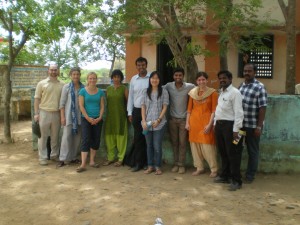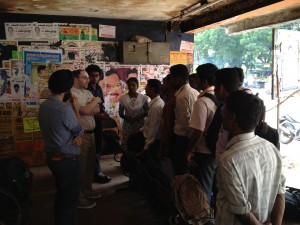 Impact of Rural Microfinance on Poverty and Well-being (fieldwork in progress)
Impact of Rural Microfinance on Poverty and Well-being (fieldwork in progress)
Financial inclusion is an increasingly popular tool in the fight against poverty, although its effectiveness remains contested. By exploiting a randomized series of banking expansions, we seek rigorous evidence of the relationship between access to financial services and agricultural technology adoption, income, consumption, health, and social networks in rural India.
with Rohini Pande, Lisa Berkman and Christopher Robert
Policy Brief
Collaborating Organization: Kshetriya Gramin Financial Services (KGFS)
Funding Organizations: Agricultural Technology Funding Initiative (ATAI), International Initiative for Impact Evaluation (3ie), IFMR Trust, Exxon Mobil Foundation, and the Science of Generosity
Long-run Impacts of Exogenous Shocks on Business Outcomes and Entrepreneurship (fieldwork in progress)
This project resurveys clients from our previous project in Kolkata, India, and measures the impact of the ongoing Indian liquidity. Specifically, we are interested on whether business size disproportionately affects survival rates among these microenterprises.
with Rohini Pande and Natalia Rigol
Collaborating Organization: Village Financial Services (VFS)
Funding Organizations: Harvard Center for Population and Development Studies and the Women and Public Policy Program (WAPP) at Harvard University
Financial Inclusion, and Female Empowerment: An Evaluation of Banking Access on Women’s Socioeconomic Status and Wellbeing (fieldwork in Progress)
MCNREGA is the largest entitlement program within India’s Ministry of Rural Development. This project randomly assigns recipients of MCRNEGA wages to different treatments, including formal banking resources, direct access to wages for women, and information on household benefits payments. The project seeks to evaluate whether these changes lead to female empowerment, and what sort of changes in women’s socioeconomic well-being arise from these changes in public policy.
with Rohini Pande, Simone Schaner and Natalia Rigol
Collaborative Organization: IFMR Research and the Government of Madhya Pradesh
Funding Organizations: Department for International Development
Women face a variety of obstacles, including cultural and religious norms, low returns to capital and inadequate access to credit when launching their microenterprises. This project randomly selected a sample of poor women across religions and castes and imparted an intensive business skills and financial literacy course to identify and assess institutional barriers to female entrepreneurship.
with Seema Jayachandran and Rohini Pande
Friends at Work: Can Peer Support Stimulate Female Entrepreneurship?
Do lack of a support network and role models contribute to the observed gender gap in microenterprises? And are these cultural constraints more strongly felt by women facing more restrictive social norms on their mobility? This project randomly selected women receiving business counseling and assistance in identifying medium-term financial goals to attend the training with a friend. The study sought to measure whether this peer support increased business activity, household income and the likelihood that a women would report an occupation other than housewife.
with Seema Jayachandran, Rohini Pande and Natalia Rigol
Collaborating Organization: SEWA Bank, SEWA Union
Funding Organization: Exxon Mobil Educating Women and Girls Initiative
Contract Design and Entrepreneurship
Proponents of the classic Grameen-style microloan attribute its success to its strict repayment schedules and scheduled client meetings. In this intervention, we modified microloan contracts- in the form of longer grace periods and flexible repayment schedules- to investigate whether financial products offered to the poor can be reshaped to improve their effectiveness.
Repayment Frequency and Default in Micro-Finance: Evidence from India
with Rohini Pande
Does the Classic Microfinance Model Discourage Entrepreneurship Among the Poor? Experimental Evidence from India
with Rohini Pande, John Papp and Natalia Rigol
Policy Brief
Repayment Flexibility Can Reduce Financial Stress: A Randomized Control Trial with Microfinance Clients in India
with Rohini Pande, John Papp and Y. Jeanette Park
Collaborating Organization: Village Financial Services (VFS)
Funding Organizations: Exxon Mobil Educating Women and Girls Initiative, the International Growth Centre (IGC), Bureau of International Labor Affairs (ILAB), and the ICICI Foundation
 The Economic Returns to Social Interaction: Experimental Evidence from Microfinance
The Economic Returns to Social Interaction: Experimental Evidence from Microfinance
One key aspect of microloans are the required repayment meetings, as it represents a social network expansion for clients. By randomly increasing the frequency of these meetings, we measured the economic benefits associated with increased social interactions and expanded social networks.
with Rohini Pande and Benjamin Feigenberg
Do Group Dynamics Influence Social Capital and Female Empowerment? Experimental Evidence from Microfinance
with Ben Feigenberg, Rohini Pande, Natalia Rigol and Shayak Sarkar
Collaborating Organization: Village Financial Services (VFS)
Funding Organizations: Exxon Mobile Educating Women and Girls Initiative, ICICI Foundation, and the Dubai Initiative
Neighborhood Effects of Housing Programs
Well-intentioned government policies on housing, such as rent controls and relocation away from poor neighborhoods, can often have unintended economic consequences. This project explores the impacts of these such policies on the residents of Ahmedabad, India.
Moving to Opportunity or Isolation? Network Effects of a Slum Relocation Program in India
with Rohini Pande and Sharon Barnhardt
Policy Brief
Segregation, Rent Control and Riots: The Economics of a Religious Conflict in an Indian City
with Matthew Levinson, Rohini Pande and Sujata Visaria
Funding Organizations: National Science Foundation (NSF), Center for Microfinance (CMF), Real Estate Academic Initiative at Harvard University and the Mossavar-Rahmani Center for Business and Government

